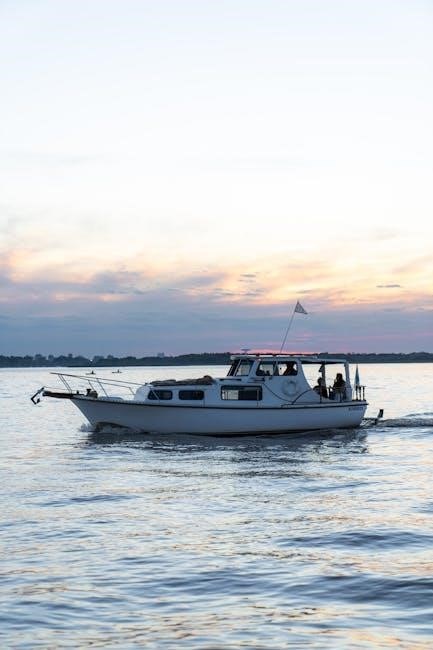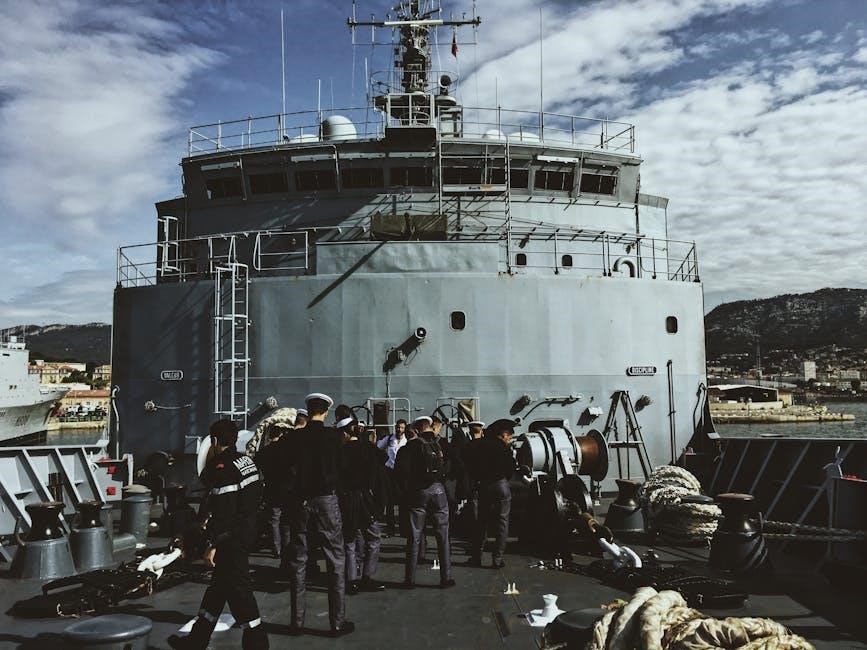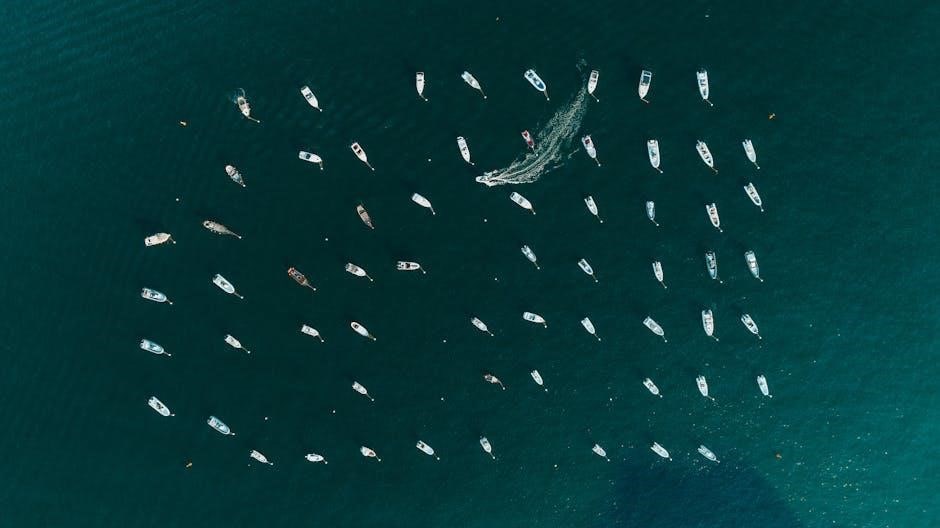
Maritime English is essential for navy officers to ensure clear communication‚ safety‚ and effective operations at sea․ It enhances professional qualifications and navigation skills‚ as outlined in the PDF guide by Elisa Bandeira‚ designed for Deck Officers and Naval students to improve their marine communication and navigation expertise․

1․1 Importance of Maritime English in Naval Operations
Maritime English is critical for navy officers as it ensures precise communication‚ safety‚ and efficiency in naval operations․ Clear English proficiency is vital for understanding navigation charts‚ meteorological data‚ and safety protocols‚ as emphasized in the IMO SMCP guidelines․ Effective communication prevents misunderstandings‚ reducing the risk of accidents at sea․ The PDF guide by Elisa Bandeira highlights how Maritime English enhances teamwork and compliance with international standards․
Proficiency in Maritime English also facilitates the interpretation of nautical publications and emergency procedures․ Officers must communicate accurately in high-stress situations‚ such as rescue operations or navigational emergencies․ The MarTEL project further underscores the need for standardized training to ensure all personnel meet these critical language requirements‚ supporting both operational success and career advancement․
1․2 Overview of the Maritime English Curriculum
The Maritime English curriculum is structured to meet the specific needs of navy officers‚ focusing on practical communication skills and maritime terminology․ It includes modules on Standard Marine Communication Phrases (SMCP)‚ nautical publications‚ and emergency procedures․ The curriculum also covers job-specific terminology for roles such as deck officers‚ engineers‚ and navigators‚ ensuring comprehensive understanding․

Resources like the PDF guide by Elisa Bandeira provide detailed lesson plans and exercises tailored for seafarers․ These materials emphasize real-life scenarios‚ enabling officers to apply their knowledge effectively․ The curriculum aligns with international standards‚ preparing officers for global maritime operations and career advancement opportunities within the navy․
Key Components of Maritime English Training
Maritime English training focuses on Standard Marine Communication Phrases (SMCP) and maritime terminology‚ ensuring effective communication and adherence to safety protocols at sea․
2․1 Standard Marine Communication Phrases (SMCP)
The Standard Marine Communication Phrases (SMCP) are essential for clear and effective communication in maritime operations․ These phrases‚ as outlined in the IMO Model Course‚ ensure that all messages are conveyed accurately‚ reducing misunderstandings․ SMCP covers routine operations‚ navigation‚ and emergency situations‚ providing a standardized vocabulary for officers․ Mastery of these phrases is critical for safe and efficient communication‚ particularly during high-stress scenarios․ The PDF guide emphasizes the importance of SMCP in adhering to international maritime standards‚ ensuring that all personnel‚ regardless of their native language‚ can communicate effectively; This standardized approach is a cornerstone of maritime training‚ enabling seamless coordination among multinational crews and ensuring compliance with global maritime protocols․
2․2 Maritime Terminology and Nautical Publications
Understanding maritime terminology and nautical publications is vital for navy officers to navigate safely and efficiently․ These resources include charts‚ meteorological information‚ and safety procedures‚ ensuring clear communication and operational accuracy․ The IMO Model Course emphasizes the importance of mastering maritime-specific vocabulary and interpreting nautical documents․ This knowledge enables officers to comprehend complex instructions and apply them effectively in real-time scenarios․ Additionally‚ publications like job profiles and rank descriptions provide clarity on roles and responsibilities within the naval hierarchy․ The PDF guide highlights how these materials are essential for both routine operations and emergency situations‚ ensuring compliance with international maritime standards and fostering professionalism among officers․ Mastery of this terminology and publications is critical for effective decision-making and seamless coordination on board;

Resources for Learning Maritime English
Recommended textbooks‚ PDF guides‚ and online courses like the IMO Model Course provide comprehensive resources for navy officers to enhance their Maritime English skills effectively․
3․1 Recommended Textbooks and PDF Guides
Several textbooks and PDF guides are available to help navy officers master Maritime English․ Elisa Bandeira’s comprehensive PDF guide is tailored for Deck Officers and Naval students‚ focusing on marine communication and navigation skills․ The IMO Model Course on Maritime English is another valuable resource‚ emphasizing standard marine communication phrases and maritime terminology․ Additionally‚ resources like “Career Paths: Navy” and the MarTEL project provide structured learning materials․ These guides cover essential topics such as safety procedures‚ emergency situations‚ and professional qualifications․ They are designed to enhance communication skills and ensure compliance with international maritime standards․ PDF materials are easily accessible and provide practical scenarios for real-world application‚ making them indispensable for officers seeking to improve their proficiency in Maritime English․
3․2 Online Courses and Training Programs
Online courses and training programs are increasingly popular for mastering Maritime English․ Platforms like Udemy and Coursera offer specialized courses designed for navy officers‚ focusing on marine communication and safety procedures․ The IMO Model Course on Maritime English is a widely recognized program‚ providing structured lessons on standard marine communication phrases and emergency situations․ Additionally‚ institutions like the MarTEL project offer online resources tailored for Merchant Navy education․ These programs often include interactive modules‚ simulations‚ and assessments to enhance learning․ They cater to officers of various ranks‚ ensuring proficiency in maritime terminology and compliance with international standards․ Online training provides flexibility‚ allowing officers to improve their skills while balancing their naval duties․

Career Development for Navy Officers
Maritime English enhances career advancement for navy officers‚ enabling effective communication and leadership․ Resources like the “Career Paths: Navy” book and online courses support skill development and promotion opportunities․

4․1 Improving Professional Qualifications

Improving professional qualifications through Maritime English is crucial for navy officers․ Resources like the Maritime English PDF guide by Elisa Bandeira and the EU-funded MarTEL project provide standardized training․ These materials focus on enhancing communication‚ navigation‚ and safety skills‚ aligning with IMO standards․ Officers can benefit from structured courses‚ such as the IMO Model Course‚ which emphasizes practical applications of English in naval operations․ Additionally‚ textbooks like Career Paths: Navy offer tailored learning for professional advancement․ Such resources ensure officers meet the required language proficiency for effective command and teamwork․ Regular training and certification programs further support career progression‚ enabling officers to excel in leadership roles and contribute to global maritime operations effectively․


4․2 Advancement Opportunities in the Navy
Mastering Maritime English significantly enhances advancement opportunities for navy officers․ Proficiency in communication and navigation skills‚ as outlined in resources like the Maritime English PDF guide‚ opens pathways to higher ranks․ Officers can progress from roles like Lieutenant to Captain‚ commanding larger vessels or holding senior shore positions․ The EU-funded MarTEL project and IMO Model Course provide standardized training‚ aiding promotion․ Effective English skills are crucial for leadership‚ enabling officers to excel in global operations and interdisciplinary teams․ Advancement opportunities also include specialized roles‚ such as marine enforcement officers or command positions in the Royal Naval Reserve․ Continuous language training and certification programs further support career growth‚ ensuring officers meet the standards for advanced responsibilities in naval operations․
Practical Applications of Maritime English
Maritime English is crucial for effective communication‚ safety procedures‚ and navigation․ It ensures clear commands‚ emergency responses‚ and accurate chart readings‚ as detailed in the PDF guide․
5․1 Effective Communication on Board
Effective communication is vital for seamless operations on naval vessels․ Clear and concise language ensures crew members understand orders‚ reducing errors․ Standard Marine Communication Phrases (SMCP) are used to maintain consistency․ Officers must articulate instructions precisely‚ especially during complex maneuvers or emergencies․ Miscommunication can lead to safety risks‚ making proficient English skills essential․ Additionally‚ international crews rely on a common language to collaborate efficiently․ Regular drills and training exercises‚ as outlined in the PDF guide‚ help officers master these communication skills‚ ensuring smooth teamwork and adherence to protocols․ Strong verbal and written English proficiency fosters a safe and productive environment aboard navy ships․
5․2 Safety Procedures and Emergency Situations
Maritime English plays a critical role in safety procedures and emergency situations․ Clear communication ensures rapid response to incidents like fires‚ system failures‚ or medical emergencies․ Standard phrases‚ as outlined in the IMO Model Course‚ help officers convey critical information accurately․ For example‚ phrases like “Mayday” or “Pan-Pan” signal distress effectively․ Understanding nautical terminology ensures crew members act swiftly during emergencies․ The PDF guide emphasizes the importance of precise language to prevent misinterpretations․ Emergency drills and simulations‚ conducted in English‚ enhance preparedness․ Proficient Maritime English skills enable officers to coordinate rescue operations and maintain order‚ safeguarding lives and vessels․ Effective communication in emergencies is paramount to preventing escalation and ensuring successful outcomes․